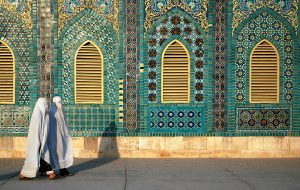Since coming into power forcefully three years ago, the Taliban have left no stone unturned to further strengthen their de facto rule over Afghanistan. The group has tightened their grip on the power, defying international pressure, and in the face of initial diplomatic isolation and economic sanctions.
Last week, the Taliban’s Ministry of Justice published its first formal vice and virtue law entitled, “Qanoon e Amr b’il Ma’ruf wa Nahi An alMunkar” which translates to the “Law on Propagation of Virtue and Prevention of Vice.” The official document, running more than 100 pages, consists of one preamble, four chapters, and 35 articles. It was ratified by the Taliban’s supreme leader, Hibatullah Akhundzada.
The law is part of a vice and virtue decree that severely restricts religious practices and personal freedoms including everyday matters such as celebrations, transportation, shaving, music, and women’s appearance and behavior. It further puts limitations on women, requiring them to always cover their bodies and faces along with prohibiting them from speaking loudly, reciting poetry, and singing in public. Furthermore, it also contains provisions targeted at men. The law includes rules on the length of men’s beards and clothing. It also curtails the rights of non-Muslim citizens to celebrate their holidays.
The so-called Ministry of Propagation of Virtue and Prevention of Vice will be responsible for the enforcement of the new law in the country. The law also defines the term “Muhtasib” (Morality Police), which refers to someone granted authority by the Taliban’s supreme leader to discipline the people of Afghanistan and impose punishments. The Morality Police will be responsible for monitoring and investigating even the most private aspects of people’s lives.
This ministry and its subordinate police are nothing new to the people of Afghanistan, particularly those who lived in the country during the Taliban’s previous period in power.
This Ministry of Vice and Virtue also existed during the Taliban’s rule between 1996 and 2001. It was a tarnished symbol of subjective abuses, mainly against young Afghan girls and women. Through imprisonment and public beatings, the ministry mercilessly enforced restrictions on women as well as men. Among other things, the officials of the ministry publicly beat women for not being accompanied by a “mehram” (a close male relative) or showing their ankles or wrists. It additionally restricted women from working as well as providing girls’ education in home-based schools. Men were prohibited from shaving and were beaten for trimming their beard.
The recently declared law under the Taliban 2.0 regime seems to be a replica of their previous rule. Jonathan Lee in his book, “Afghanistan: A History from 1260 to the Present,” highlighted that the ministry was originally established in 1992 by Afghan President Burhanuddin Rabbani and was modeled on Saudi Arabia’s religious police. The officials of the ministry roamed the streets of Afghanistan in order to enforce the rules and enforce attendance at prayers. Those who failed to comply with the established code were whipped, mostly in public. Radio Kabul was renamed Radio Sharia while television and music were banned apart from non-instrumental religious chants and Na’at (poetry in praise of the last prophet of Islam, Prophet Muhammad). Additionally, the Taliban also banned the celebration of Nowruz since they regarded it as un-Islamic.
With the new virtue and vice law, the Taliban are on track to take the country back to the norms of their late 1990s rule. It is, however, unknown how the Taliban’s Moral Police will find out about people’s private lives. Moreover, although some violations are clearly defined, how will they determine what qualifies as “immoral” and thus punishable?
The law is a clear gimmick by the Taliban to strengthen their power by imposing unwritten laws on the people of Afghanistan whose condition is already deplorable.
Even though the law has been condemned by the international community, the enactment of such a law was expected to come sooner or later. The Taliban have been essentially granted immunity by the international community, as demonstrated by the U.S. agreement in Doha in 2020 and the most recent Doha process. The Taliban are aware of their political power.
Since the global community is more reactive than proactive, the regime in Kabul has been strategically using their proactiveness in their favor which further affirms their rule. The Taliban regime in Kabul has long proved to be irremovable, despite internal as well as external, pressure. After the initial pressure to form an inclusive government, the international community has been gradually backtracking from that position which is evident in the recent development of ties between the Taliban and several countries including China, India, the United Arab Emirates, Russia, Pakistan, Nicaragua, Turkey, and the countries in Central Asia. Although short of “formal” recognition, these ties are to the Taliban an effective recognition of their power over the people of Afghanistan.
Despite these ties, the Taliban will not change their course of action within the country. Afghans, in particular girls and women, are likely to suffer more under the Taliban’s increasingly draconian rule. The recently enacted law will further worsen conditions for the common people in the country whose everyday public and private life will be prone to privacy breaches by the Ministry of Virtue and Vice’s Moral Police. For the de facto rulers of Kabul, this further strengthens their political power as they compel people to abide by unjust laws imposed by an unelected regime.

































